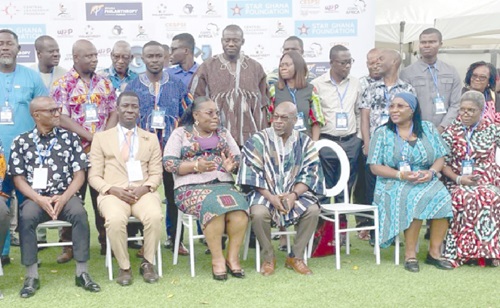The Deputy Chief of Staff in charge of Administration, Nana Oye Bampoe Addo, has underscored the urgent need for Ghana to strengthen domestic resource mobilisation to drive accelerated and inclusive national development.
She said Ghana could not rely indefinitely on external aid, especially as traditional funding sources were shrinking and global financing conditions were becoming increasingly uncertain.
"No nation has ever developed by outsourcing its destiny and the wealth that we seek to develop Ghana is not hidden in distant lands. It lies in our own hands. It is in our hearts and also from our habits,” she stated.
Speaking at the third Ghana Philanthropy Conference 2025, organised by STAR Ghana Foundation on the theme: "Repositioning Domestic Resource Mobilisation as a Catalyst for Accelerating Development,” Ms Bampoe Addo described domestic resource mobilisation as central to achieving fiscal sovereignty.
She explained that Ghana must address the structural gaps undermining resource generation, particularly illicit financial flows, tax evasion and operational inefficiencies.
"Domestic resource mobilisation has become the single most important determinant of Ghana's fiscal sovereignty, especially at a time when traditional aid is dwindling, declining and global financing conditions are tightening,” she added.
The conference aims to promote dialogue on the changing philanthropic landscape in Ghana and across Africa, where giving is shifting from acts of charity to more strategic and impactful interventions that support sustainable development.
Philanthropy
The Deputy Chief of Staff explained that the government's approach was rooted in a social democratic philosophy that placed people at the centre of development.
This, she said, was demonstrated through various initiatives targeting vulnerable populations, including free secondary and tertiary education, youth training programmes and sector-specific interventions such as the Nkoko Nkitinkiti poultry initiative and the Women's Development Bank.
Ms Addo emphasised the importance of creating an enabling ecosystem for philanthropy in Ghana, highlighting the need for a comprehensive legal and policy framework to coordinate and maximise the impact of local philanthropic efforts.
She suggested building strong collaborations with government, civil society and the private sector, while supporting digital platforms that enable philanthropy, inspired by global models such as GoFundMe.
She also emphasised the potential of utilising technology to facilitate donations from the Ghanaian diaspora and global citizens, whilst ensuring cybersecurity and accountability.
By mobilising internal resources, creating transparent institutions and working collaboratively, Ms Addo said Ghana could define its development path and transform domestic resource mobilisation from a policy tool into a national movement of shared sacrifice and prosperity.
"Let us, therefore, rise as one people, pooling our ideas, our taxes, our creativity and our patriotism to build a Ghana that funds its future and defines its development path,” she said.
Aid model
The Executive Director of STAR Ghana, Ibrahim-Tanko Amidu, said domestic resource mobilisation needed to move beyond dependence on external aid, highlighting the limitations and frustrations of the current aid model, in which donor priorities can shift unpredictably, disrupting long-term development efforts.
He argued that national priorities and a commitment to inclusive development should drive resource mobilisation.
He said it was important to construct a new development paradigm that centred on Ghanaian agency and ensured that no citizen was left behind.
The Chief Executive Officer of Millennium Development Authority (MiDA Ghana), Alexander Mould, explained that Ghana was currently facing complex developmental challenges, with a multifaceted approach needed to address critical areas such as "energy reliance, climate adaptation, food systems modernisation and youth employment."
He stressed that although the country had passionate stakeholders, there was a fundamental structural gap in how philanthropic and development efforts were coordinated.
"Without this architecture, much of our goodwill has remained fragmented and too many promising ideas have struggled to grow,” he stated.
Mr Mould said Ghana has "no shortage of commitment or good ideas" but critically lacks the systems to bring these efforts together effectively.

